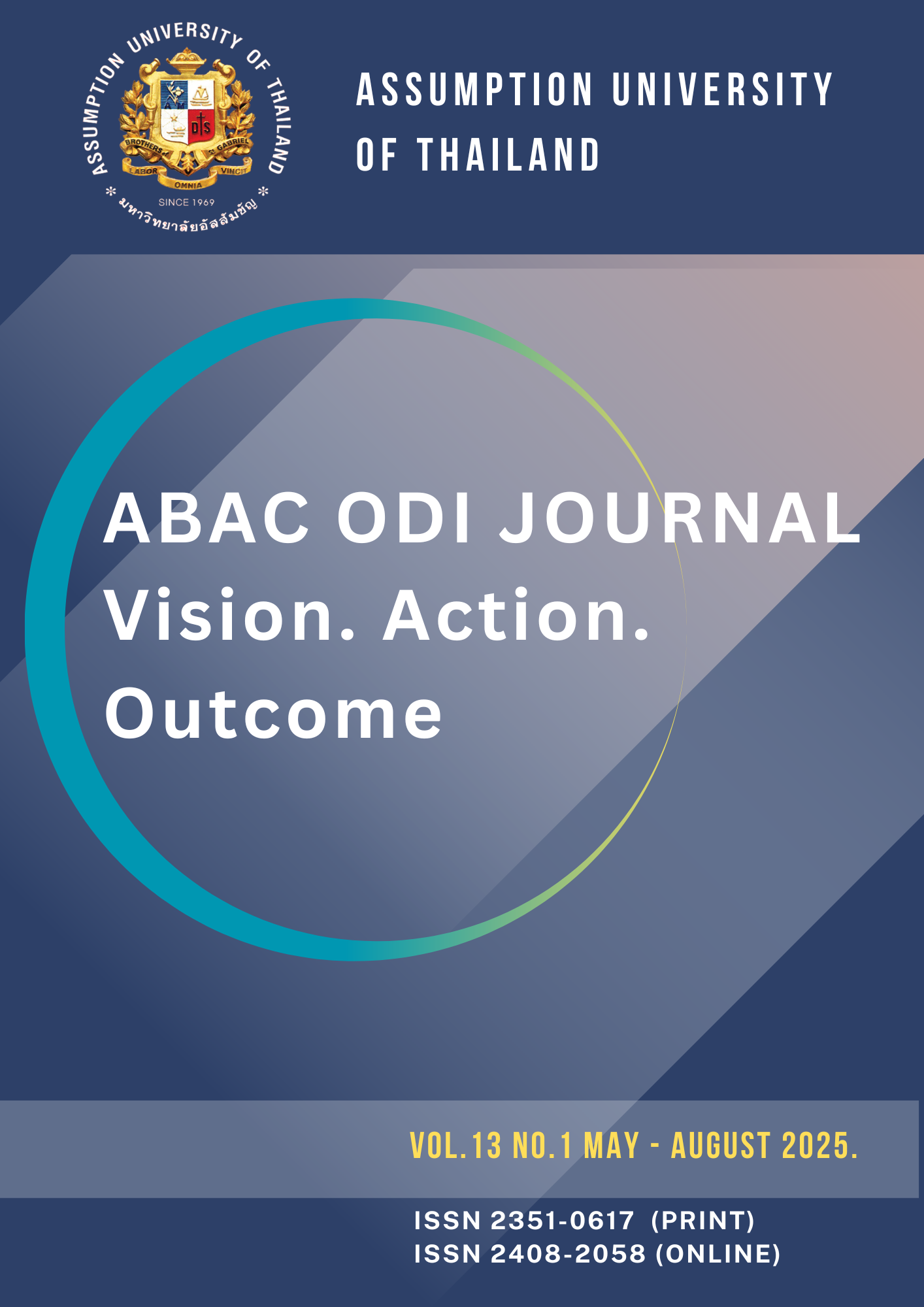Strategic Plan to Enhance Employee Wellbeing at Karen Women Empowerment Group
DOI:
https://doi.org/10.14456/abacodijournal.2025.26Abstract
Humanitarian workers in Myanmar face unprecedented challenges as they navigate the complexities of a political crisis and ongoing conflict. These individuals endure significant physical and psychological harm due to the unstable environment, which is marked by civil unrest and limited access to vulnerable populations. This study aims to explore the employee well-being of the Karen Women Empowerment Group (KWEG) staff and to develop a long-term strategy to enhance their well-being through initiatives in Organizational Support, Leadership, and Effective Coping Mechanisms. The research has three main objectives: 1) To evaluate the current coping strategies and support systems available to employees that enhance the employee wellbeing at KWEG; 2) To gather employee insights on wellbeing support, current and preferred to enhance employee wellbeing at KWEG; and 3) to design strategies that enhance employee wellbeing based on the findings. The research questions, which focus on employee well-being at KWEG, were developed using the Appreciative Inquiry (AI) model. Purposive sampling was employed to select participants for the qualitative research, ensuring the inclusion of eight informants with relevant experiences or characteristics to address the research objectives effectively. Two virtual focus group discussions, each consisting of four participants, were conducted to gather in-depth insights and create a collaborative space for all informants to contribute meaningfully. The results reveal that KWEG staff envision a positive workplace culture, which can be achieved by promoting mutual respect, understanding, and support among colleagues. This culture should be complemented by supportive leadership that encourages employees to express their needs freely, fosters appreciation and trust, cultivates empathy, and implements effective coping strategies. Key strategies identified include flexible working hours, regular team outings, psychosocial counseling sessions, a reassurance policy for staff health, and the cultivation of a positive working environment.
References
Aggarwal-Gupta, M., Vohra, N., & Bhatnagar, D. (2010). Perceived organizational support and organizational commitment: The mediational influence of psychological well-being. Journal of Business and Management, 16(2), 105-124
https://jbm.johogo.com/pdf/volume/1602/JBM-1602-01-full.pdf
Allen, D. G., Shore, L. M., & Griffeth, R. W. (2003). The role of perceived organizational support and supportive human resource practices in the turnover process. Journal of Management, 29(1), 99-118. https://doi.org/10.1177/014920630302900107
Amabile, T. M., Schatzel, E. A., Moneta, G. B., & Kramer, S. J. (2004). Leader behaviors and the work environment for creativity: Perceived leader support. The Leadership Quarterly, 15(1), 5-32. https://doi.org/10.1016/j.leaqua.2003.12.003
Arnold, K. A. (2017). Transformational leadership and employee psychological well-being: A review and directions for future research. Journal of Occupational Health Psychology, 22(3), 381-393. https://doi.org/10.1037/ocp0000057
Bakker, A. B., & Demerouti, E. (2008). Towards a model of work engagement. Career Development International, 13(3), 209-223.
https://doi.org/10.1108/13620430810870476
Brun, J. P., & Dugas, N. (2008). An analysis of employee recognition: Perspectives on human resources practices. The International Journal of Human Resource Management, 19(4), 716-730. https://doi.org/10.1080/09585190801953723
Carver, C. S., Scheier, M. F., & Weintraub, J. K. (1989). Assessing coping strategies: A theoretically based approach. Journal of Personality and Social Psychology, 56(2), 267-283. https://doi.org/10.1037//0022-3514.56.2.267
Cheng, J., Zhang, T., Lin, L., Guo, H., & Zhang, Z. (2022). Enhancing employee wellbeing by ethical leadership in the construction industry: The role of perceived organizational support. Frontiers in Public Health, 10, 935557.
https://doi.org/10.3389/fpubh.2022.935557
Chiang, C.-F., & Hsieh, T.-S. (2012). The impacts of perceived organizational support and psychological empowerment on job performance: The mediating effects of organizational citizenship behavior. The International Journal of Human Resource Management, 23(2), 411-429. https://doi.org/10.1080/09585192.2011.561960
Compas, B. E., Connor-Smith, J. K., Saltzman, H., Thomsen, A. H., & Wadsworth, M. E. (2001). Coping with stress during childhood and adolescence: Problems, progress, and potential in theory and research. Psychological Bulletin, 127(1), 87-127.
https://doi.org/10.1037/0033-2909.127.1.87
Craun, S. W., & Bourke, M. L. (2014). The use of humor to cope with secondary traumatic stress. Journal of Child Sexual Abuse, 23(7), 840-852.
https://doi.org/10.1080/10538712.2014.949395
Comms APHEDA. (2024). Karen Women are speaking out for their community - Union Aid Abroad. Union Aid Abroad. https://www.apheda.org.au/karen-women-are-speaking-out-for-their-community-2/
Danna, K., & Griffin, R. W. (1999). Health and well-being in the workplace: A review and synthesis of the literature. Journal of Management, 25(3), 357-384.
https://doi.org/10.1177/014920639902500305
De Simone, S. (2014). Conceptualizing wellbeing in the workplace. International Journal of Business and Social Science, 5(12), 118-122.
Edmondson, A. C. (1999). Psychological safety and learning behavior in work teams. Administrative Science Quarterly, 44(2), 350-383. https://doi.org/10.2307/2666999
Eisenberger, R., Huntington, R., Hutchison, S., & Sowa, D. (1986). Perceived organizational support. Journal of Applied Psychology, 71(3), 500-507.
https://doi.org/10.1037/0021-9010.71.3.500
Grant, A. M., Christianson, M. K., & Price, R. H. (2007). Happiness, health, or relationships? Managerial practices and employee well-being tradeoffs. Academy of Management Perspectives, 21(3), 51-63. https://doi.org/10.5465/amp.2007.26421238
Greenhaus, J. H., & Powell, G. N. (2006). When work and family are allies: A theory of work-family enrichment. Academy of Management Review, 31(1), 72-92.
https://doi.org/10.5465/amr.2006.19379625
Guest, G., Bunce, A., & Johnson, L. (2006). How many interviews are enough? An experiment with data saturation and variability. Field Methods, 18(1), 59-82.
https://doi.org/10.1177/1525822X05279903
Hagelstam, E. (2017). Wellbeing at work, workplace health promotion, and employee productivity: A case study of sales representatives. International Business https://urn.fi/URN:NBN:fi:amk-201703273741
Hobfoll, S. E., Watson, P., Bell, C. C., Bryant, R. A., Brymer, M. J., Friedman, M. J., Friedman, M., Gersons, B. P. R., de Jong, J. T. V. M., Layne, C. M., Maguen, S., Neria, Y., Norwood, A. E., Pynoos, R. S., Reissman, D., Ruzek, J. I., Shalev, A. Y., Solomon, Z., Steinberg, A. M., & Ursano, R. J. (2007). Five Essential Elements of Immediate and Mid–Term Mass Trauma Intervention: Empirical Evidence. Psychiatry: Interpersonal and Biological Processes, 70(4), 283-315. https://doi.org/10.1521/psyc.2007.70.4.283
Kayastha, J. (2018). Well-being at work, workplace health promotion and productivity: Case Snellmanin Kokkikartano Oy [Bachelor's thesis]. Centria University of Applied Sciences.
Kelloway, E. K., Turner, N., Barling, J., & Loughlin, C. (2012). Transformational leadership and employee psychological well-being: The mediating role of employee trust in leadership. Work & Stress, 26(1), 39-55.
https://doi.org/10.1080/02678373.2012.660774
Khoury, B., Lecomte, T., Fortin, G., Masse, M., Therien, P., Bouchard, V., Chapleau, M.-A., Paquin, K., & Hofmann, S. G. (2013). Mindfulness-based therapy: A comprehensive meta-analysis. Clinical Psychology Review, 33(6), 763-771.
https://doi.org/10.1016/j.cpr.2013.05.005
Kohrt, B. A., & Hruschka, D. J. (2010). Nepal’s mental health care gap: Exploring barriers to treatment and addressing the needs of the vulnerable. International Journal of Culture and Mental Health, 3(1), 34-51. https://doi.org/10.1080/17542863.2010.488235
Kossek, E. E., Pichler, S., Bodner, T., & Hammer, L. B. (2011). Workplace social support and work-family conflict: A meta-analysis clarifying the influence of general and work-family-specific supervisor and organizational support. Personnel Psychology, 64(2), 289-313. https://doi.org/10.1111/j.1744-6570.2011.01211.x
Kuang, M., Yuliana Anggraini, D., & Rohman, A. (2023). Triad of Employee Performance: Leadership, Organizational Support, and Well-Being. International Journal of Innovation, Creativity and Change, 17(2), 455-475.
https://doi.org/10.53333/ijicc2013/17208
Kuoppala, J., Lamminpää, A., Liira, J., & Vainio, H. (2008). Leadership, job well-being, and health effects—a systematic review and a meta-analysis. Journal of Occupational and Environmental Medicine, 50(8), 904-915.
https://doi.org/10.1097/JOM.0b013e31817e918d
Kurtessis, J. N., Eisenberger, R., Ford, M. T., Buffardi, L. C., Stewart, K. A., & Adis, C. S. (2017). Perceived organizational support: A meta-analytic evaluation of organizational support theory. Journal of Management, 43(6), 1854-1884.
Mayordomo-Rodríguez, T., Meléndez, J. C., Viguer, P., & Sales, A. (2015). Coping strategies as predictors of well-being in youth adults. Social Indicators Research, 122(2), 479-489. https://doi.org/10.1007/s11205-014-0689-4
Montano, D., Reeske, A., Franke, F., & Hüffmeier, J. (2017). Leadership, followers' mental health and job performance in organizations: A comprehensive meta-analysis from an occupational health perspective. Journal of Organizational Behavior, 38(3), 327-350. https://doi.org/10.1002/job.2124
Nielsen, K., Nielsen, M. B., Ogbonnaya, C., Känsälä, M., Saari, E., & Isaksson, K. (2017). Workplace resources to improve both employee well-being and performance: A systematic review and meta-analysis. Work & Stress, 31(2), 101-120.
https://doi.org/10.1080/02678373.2017.1304463
Patton, M. Q. (2002). Qualitative research and evaluation methods (3rd ed.). Sage Publications.
Robertson, I. T., Cooper, C. L., Sarkar, M., & Curran, T. (2015). Resilience training in the workplace from 2003 to 2014: A systematic review. Journal of Occupational and Organizational Psychology, 88(3), 533-562. https://doi.org/10.1111/joop.12120
Saks, A. M. (2006). Antecedents and consequences of employee engagement. Journal of Managerial Psychology, 21(7), 600-619. https://doi.org/10.1108/02683940610690169
Shore, L. M., & Shore, T. H. (1995). Perceived organizational support and organizational justice. In R. S. Cropanzano & K. M. Kacmar (Eds.), Organizational politics, justice, and support: Managing the social climate of the workplace (pp. 149-164). Quorum Books.
Sirgy, M. J. (2012). The psychology of quality of life: Hedonic well-being, life satisfaction, and eudaimonia. Springer Science & Business Media
Slack, D. P. (2020). Trauma and coping mechanisms exhibited by forensic science practitioners: A literature review. Forensic Science International: Synergy, 2, 310-316. https://doi.org/10.1016/j.fsisyn.2020.10.004
Tepper, B. J. (2000). Consequences of abusive supervision. Academy of Management Journal, 43(2), 178-190. https://doi.org/10.5465/1556375
Tol, W. A., Barbui, C., Galappatti, A., Silove, D., Betancourt, T. S., Souza, R., Golaz, A., & van Ommeren, M. (2011). Mental health and psychosocial support in humanitarian settings: linking practice and research. The Lancet, 378(9802), 1581-1591.
https://doi.org/10.1016/s0140-6736(11)61094-5
Wang, Y. (2024). Exploring the impact of workload, organizational support, and work engagement on teachers’ psychological wellbeing: A structural equation modeling approach. Frontiers in Psychology, 14, 1345740.
https://doi.org/10.3389/fpsyg.2023.1345740
Warr, P. (1994). A conceptual framework for the study of work and mental health. Work & Stress, 8(2), 84-97. https://doi.org/10.1080/02678379408259982
Warr, P. (2007). Work, happiness, and unhappiness. Happiness Studies, 8(2), 189-205. https://doi.org/10.1007/s10902-006-9018-0
Wayne, S. J., Shore, L. M., Bommer, W. H., & Tetrick, L. (1997). Perceived organizational support and leader-member exchange: A social exchange perspective. Academy of Management Review, 22(3), 82-111. https://doi.org/10.5465/amr.1997.9707111496
Whitener, J. A. (2001). Organizational justice and human resource management. Journal of Business Ethics, 29(3), 159-178. https://doi.org/10.1023/A:1010700818387
Wrzesniewski, A., & Dutton, J. E. (2001). Crafting a job: Revisioning employees as active crafters of their work. Academy of Management Review, 26(2), 179-201. https://doi.org/10.5465/amr.2001.4378011




